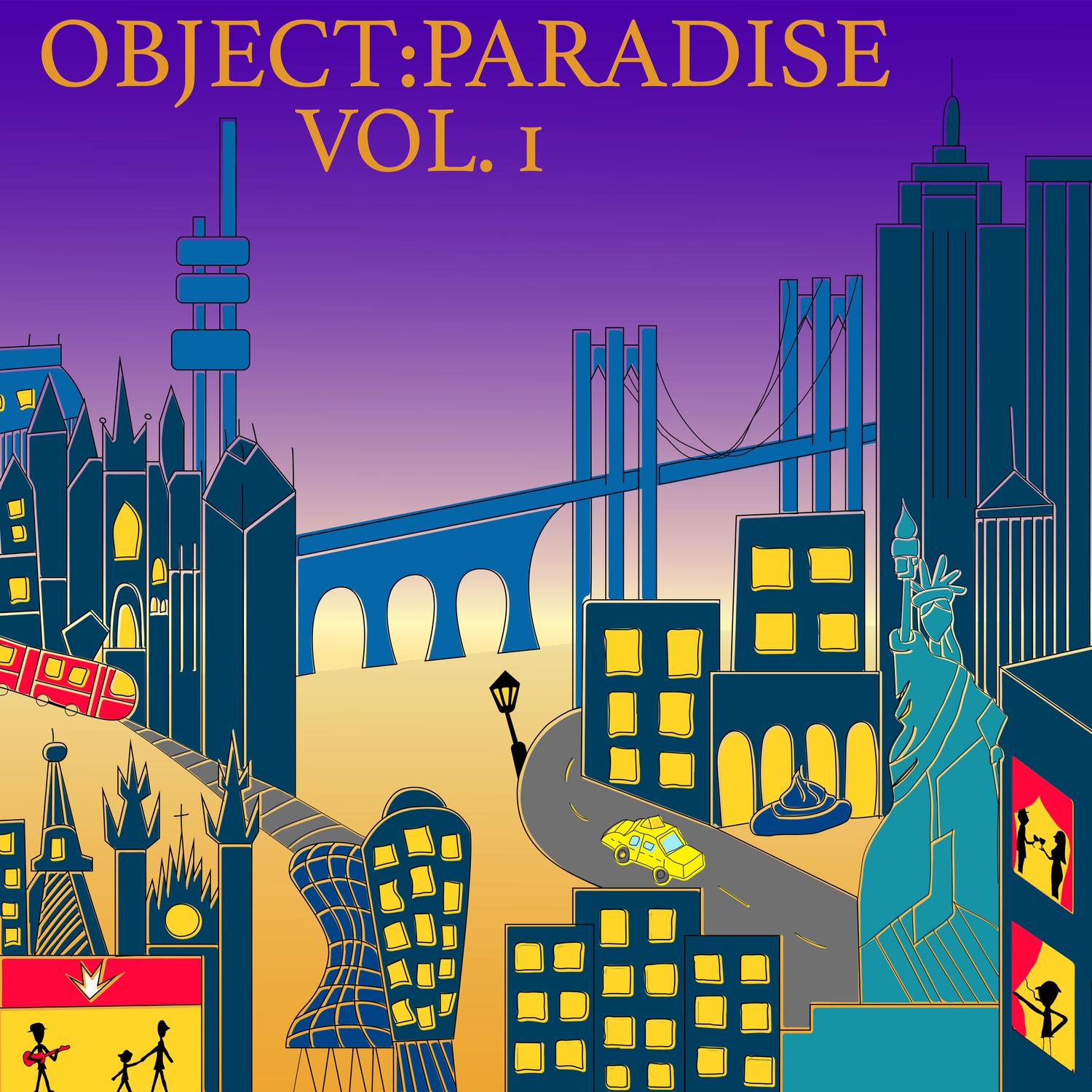
Past Events / Film, Curation
︎ ︎ ︎ ︎ ︎
HOME / MANIFESTO / UPCOMING
EVENTS / MEDIA / PAST EVENTS / STORE / ABOUT
Channels of Communication
November 30th 2019 @ Zázemí Prague, Czech RepublicA room tuned like radio: language in ears, bodies in motion, and improvised sound folding the audience into the now. For one night everyone became a co-author.
Channels of Communication was the fourth language happening curated from the OBJECT:PARADISE Manifesto, taking place on November 30th 2019 at Zázemí, Prague.
The curation set out to place attendees in the same channel of communication by creating an environment where sound and action co-authored the connotative forces of language. The aim was to imagine poetry as an inclusive medium that dissolves the performer–audience binary, merging producer and receiver into a shared role. Throughout the evening, participants witnessed an improvized interdisciplinary poetics of language & body transform into a singular channel of communication.
A paint worth watching dry: a recount of Channels of Communication
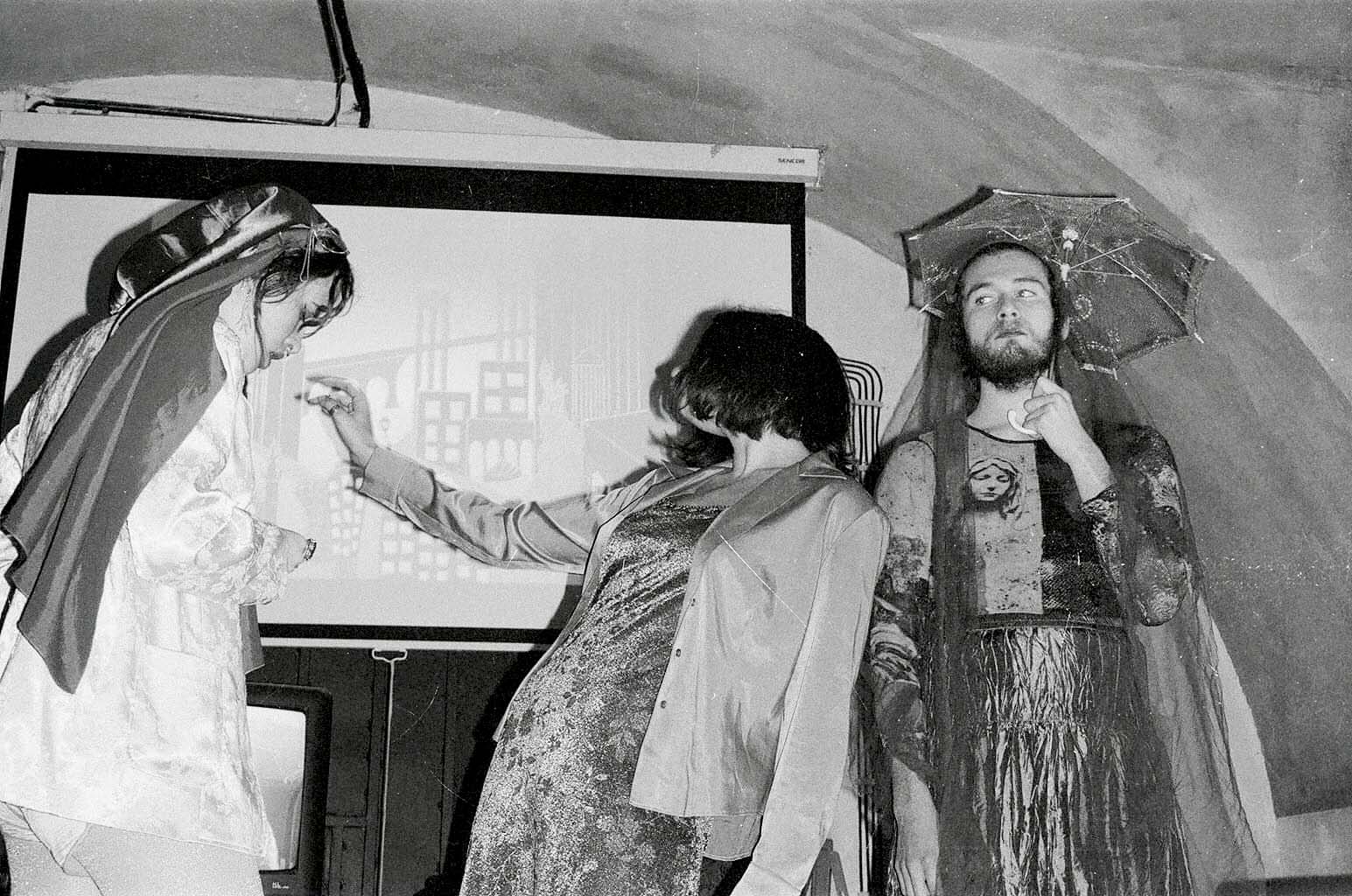
Written by Tyko Say, September 07, 2025
Channels of Communication opened with a walkie-talkie sitting on a stool before a mic stand. It was 8pm at the end of November. A woman in lipstick blue looks through the wrought iron from the cobbled Prague street—what will happen? 2019.
The room is quiet and curious. Four TVs sit on beer crates. A canvas erected unattended. A keyboard and a beer coster. 8pm. A chair not yet sat in. A turkish rug and a cut out square of laminate littered. Eyes open. A micstand sits before a walkie-talkie that talks and hisses static.
Heyme Langbroek presses his pink lips to his brass tube and toys his tongue to the shape of air expressed behind the ribcage.
The micro-voice in the walkie-talkie becomes large in the room. Eyes begin to undress the sentence in treble.
“Here you are: the universe before you, reflection of skyline strung in the room chaotic. It must mean something. Television towers peering down liberty’s nickel. Girl in blue lipstick through the window. You know this language—all the reverberating verbs in your vino foot bounce. Have seen yourself here before. You understood the rhythms and sounds of all the languages in the world (without reason).”
Tyko Say creeps from the back of the room towards the sound holding the other walkie-talkie, sporting a striped shirt slightly but evidently ripped at the collarbone, a hat too big, pants too small, and shoes shined in moonlit Božkov. He grabs the mic stand by the throat and adjusts both walkie-talkies to his mouth, each becoming the ear—a screech of feedback lets out like a truck axle at 11 p.m. outside as the garbage men toss in the leftovers from the kitchen.
“There is a conversation happening: a group of men in khakis, smoking outside in November teeth chatter. You feel joyous and are familiar as a sentence. Cool joint. Jazz man bellowing boyish bopping of piano keys. You awe your neck back & see the notes strung along the ceiling like a clothesline of some trumpet toot toots. What is happening? Is this a love sonnet spoken through helium? A woman painting the body of a canvas with her own? What have they done to language?”

The TVs on the stage click on and then off and then on. A live feed of Tyko appears, scanlines across his chest. The room edges the audience onto the balls of their feet as they sit, observable, observing the sound as they’re in it—what will happen? Michael Rowland yells out, “Owwwe!”
“Some man you saw on the escalator in some metaphoric metropol is here?! Here? you are: listening and speaking, with closed lips, body swaying. Open to all channels of communication as boy in mirror getting dressed for evening splendor (like a real life lover). A sentence is not a complete thought. You think. Neither is this one. But you know what it means—the sights and sounds of the great stage.”
Roksan Mandel sits at the keys and massages the ends of her fingers against the whites and blacks as the stage slouches under the echo of Heyme’s horn.
“The body covered in paint. The rhythm of not going home. The eyes you came with stuck behind the tooth, and you are speaking some foreign verb. And understand the language before you had not ever been learned, only known when you opened your ears, eyes, and palms (without reason like a real life lover). So here you are: the universe before you, reflection of conversation strung in your head static.”
The audience looks on in kaleidoscope eyes, taking in the fractal of sound and image in a way that, for a moment, communicates only the question: “to beer or not to beer?” A French-canadian offers you a cigarette. It’s happening.
The piano slips against the 14th-century architecture, the trumpet pats, and TVs flicker a televised, contemporary Thor Garcia approaching the stage beneath a red felt hat, clean black leather gloves, and a pristine pinched white collar that frames his body neat at center stage. He begins swaying at the hips, throttling the mic.
“GUN GUN GUN.
THEY’RE BANGING YOUR WIFE.”
“GUN GUN GUN. THEY WANT THE WORLD.”
The entire room turns into a casino where no one wins because everyone’s playing. Dollar signs appear as shadows cast from the wrought iron, and a man who stumbled in from a stag party from faraway Britain stops yelling only to whisper, “What is this?”
No one knows because it hasn’t happened yet because it is happening. All of it. We’ve struck it big.
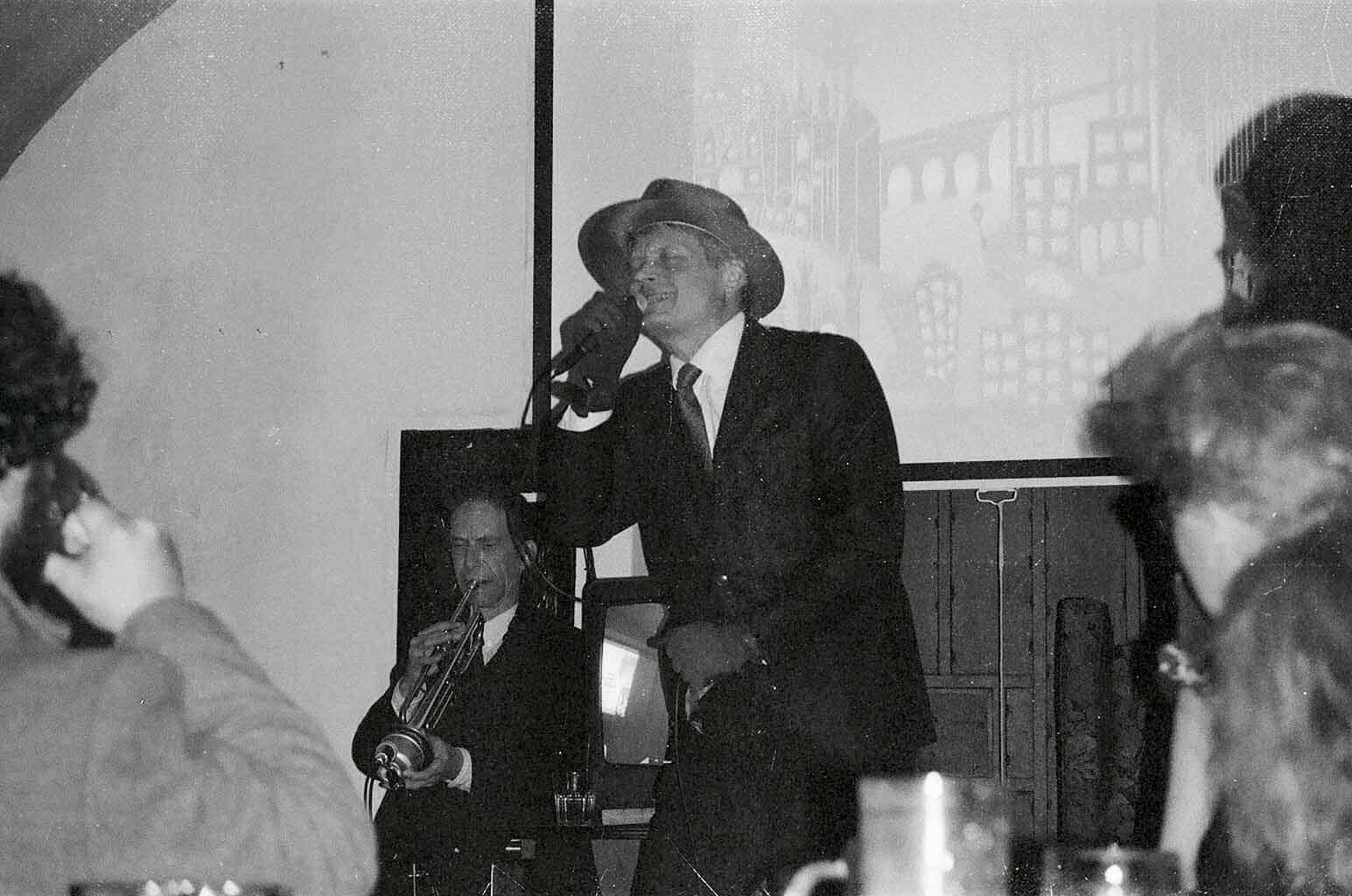
“This is… it’s like… like a concert? an open mic? Is he famous? You know him? What’s happening?”
“THEY’RE BANGING YOUR WIFE.”
The British man dips his diphthong into the hum of the room and hides his schwa under a coaster not yet wet with beer.
Jaromír Lelek in a military parka and scarf and sweatpants with a giant “69” written on the left thigh sits & sucks helium from an undisclosed balloon,
“I’m off my tits on LSD and I see all the Jaromírs from the past and all the Jaromírs from the future intersecting.”
“We need to channel theee communication.”
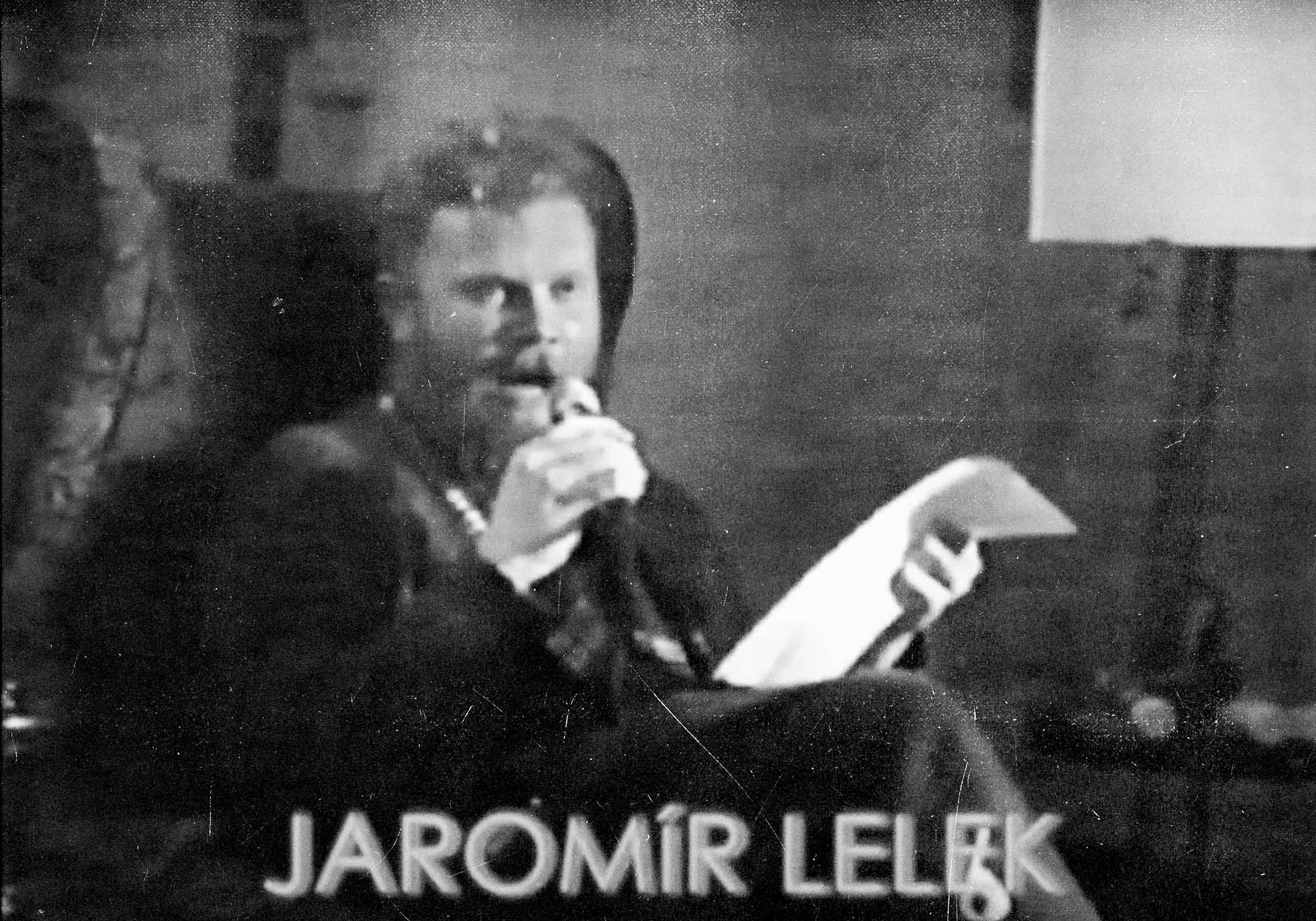
The snow of the TV becomes warmer and cooler and pulls the orange strands of self growing from the bulb tête of the armchaired orchestrator.
“huge rusty antenna
posing as hung
pathetic
nipples
broadcasting its circuit
servant
and analogue
vlog...
Why don’t you
split an atom?”
Why don’t you
split an atom?”
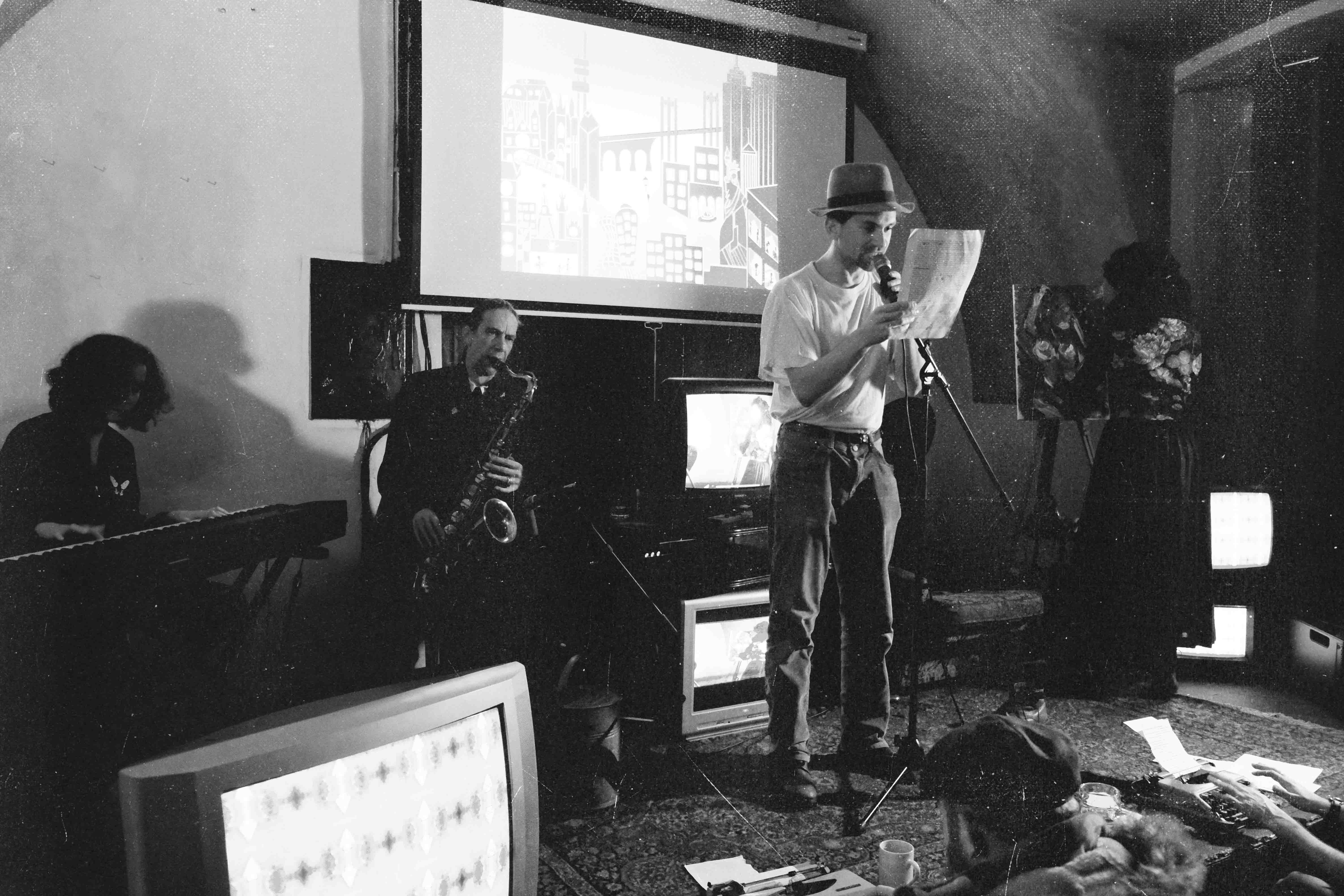
The piano echoes the horn. The horn echoes the words. The words echo the ear. The ear echoes the mouth.
Vojtěch Kudla, in white tee and straw hat, makes his way through the mess of language and first displays his by taking his shoes off on stage.
“My sole came off”
“My soul came off”
“My sole came off”
“She looked lovely. So I loved her.”
Clara Zangova behind him assumes position and begins painting with her back to the commotion, the motion of her brush in rhythm of nothing and everything at all once. A singular composition and a word worth learning. “everything.” And together the piano and the voice hang notes high for the horn to hoop thru.
Tyko and Jaromír sit with typewriters at Vojtěch’s feet as he continues expressing the alphabet in context. e-v-e-r-y. A harmonizing of hammer swings striking the page like a mechanical meltdown of canvas brushstroke, language in exodus, intra-sentence. Jaromír drinks chai to sooth the inner. A poem begins to form.
The crowd’s whispers become real words and then real yells as hollering and screeching establish a shared channel of communication and a paint worth watching dry.
“My soul came off”
“My sole came off”
“She looked lovely. So I loved her.”
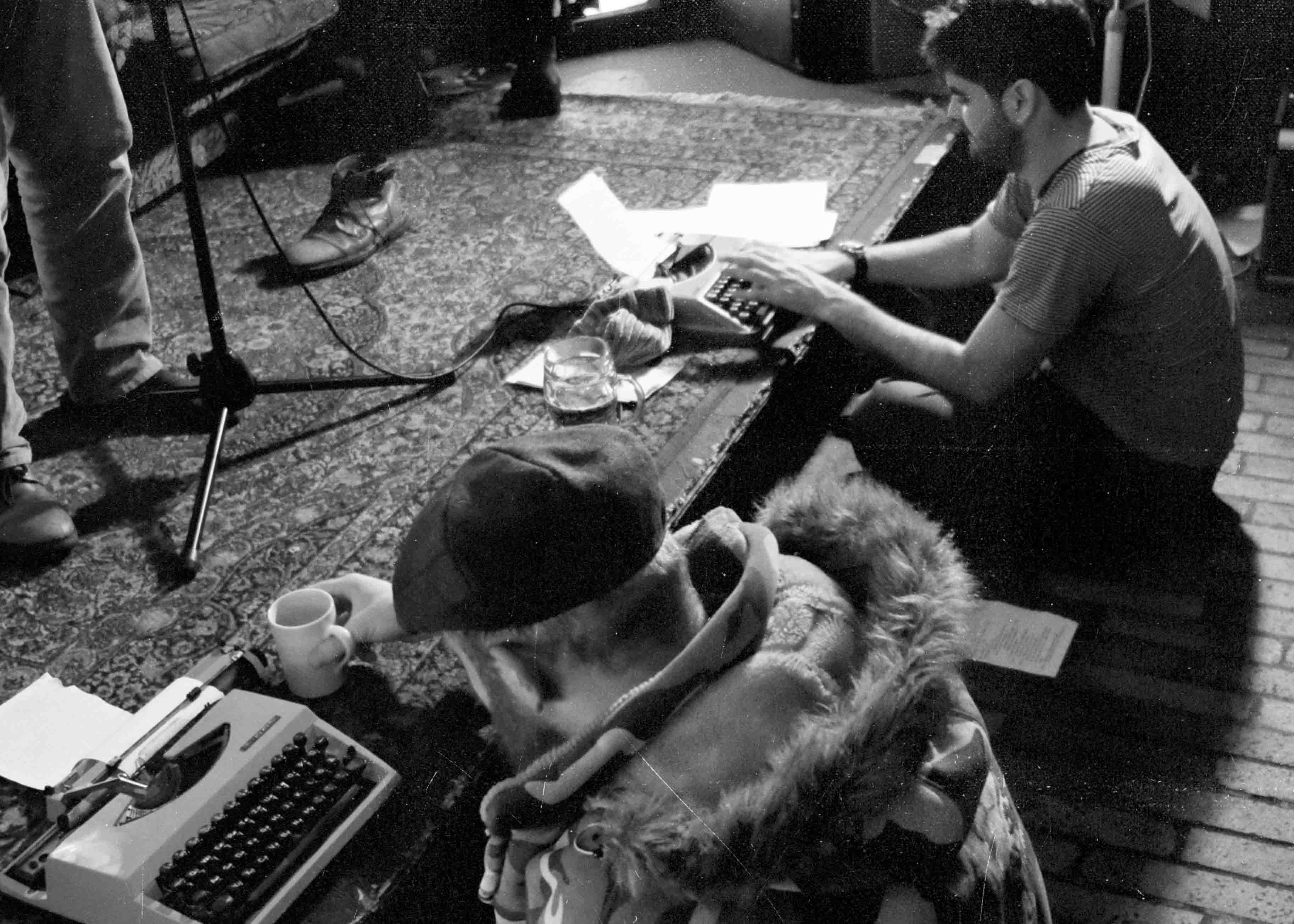
Ásgeir H Ingólfsson, then, comes to the stage with a grin that says only “now.” He has a new intention and language to test it with.
The trams at Národní třída, for a moment, open their doors for a second longer. And down the street a hint of horn lets itself in and sits quietly near the tram driver who won’t finish his shift until two hours later.
Zázemí quiets down as the echo becomes softer. The piano walks, hunched with the language.
“I also wanted to tell you
that I was sorry that I didn’t
tell you
everything”
“I also remember the whiteness
the complete whiteness
when you disappeared
somewhere
between Athens
and Prague”
And all the poems and poetries began to have new meanings. Prague’s 22 in Exarcheia. Giraffes in Icelandia. Language in migration.
![Ásgeir H Ingólfsson at OBJECT:PARADISE : Channels of Communication]()
![Clara Zangova at OBJECT:PARADISE : Channels of Communication (November 30, 2019)]()
Sandra Pasławska mixes her signals into the TVs, mapping the emotions of hands to the buttons on a Roland-V4 video mixer. A live composition of static, color, and language appear on stage, casting a neon layer onto Ásgeir’s knuckles with Clara’s vertical strips of color adjacent.
It’s 10:30 on a Saturday. Beer is 40 Kč. 80 degrees Celsius. A smile of a woman you had seen somewhere appears on a chair next to you. A man with a haircut thinks about dropping out of art school and pursuing the phlegm in his throat--the Vltava, too, channeling, eventually, to a bigger body.
Heyme lets his horn whine and drag across the loose punctuation of footsteps and clapping hands as the first half of the evening comes to a slow march against the strike of 11 p.m.
The cameras pan left to an image of Stephan Delbos with a pint of beer in hand extruding from the heavy black jacket. You look at the TV but do not watch it. Tyko and Jaromír look up from the type machine mayhem and start yelling, “It’s him! It’s him!”
The audience answers back, “It’s him!” “It’s him!”
that I was sorry that I didn’t
the complete whiteness
when you disappeared
somewhere
between Athens
and Prague”
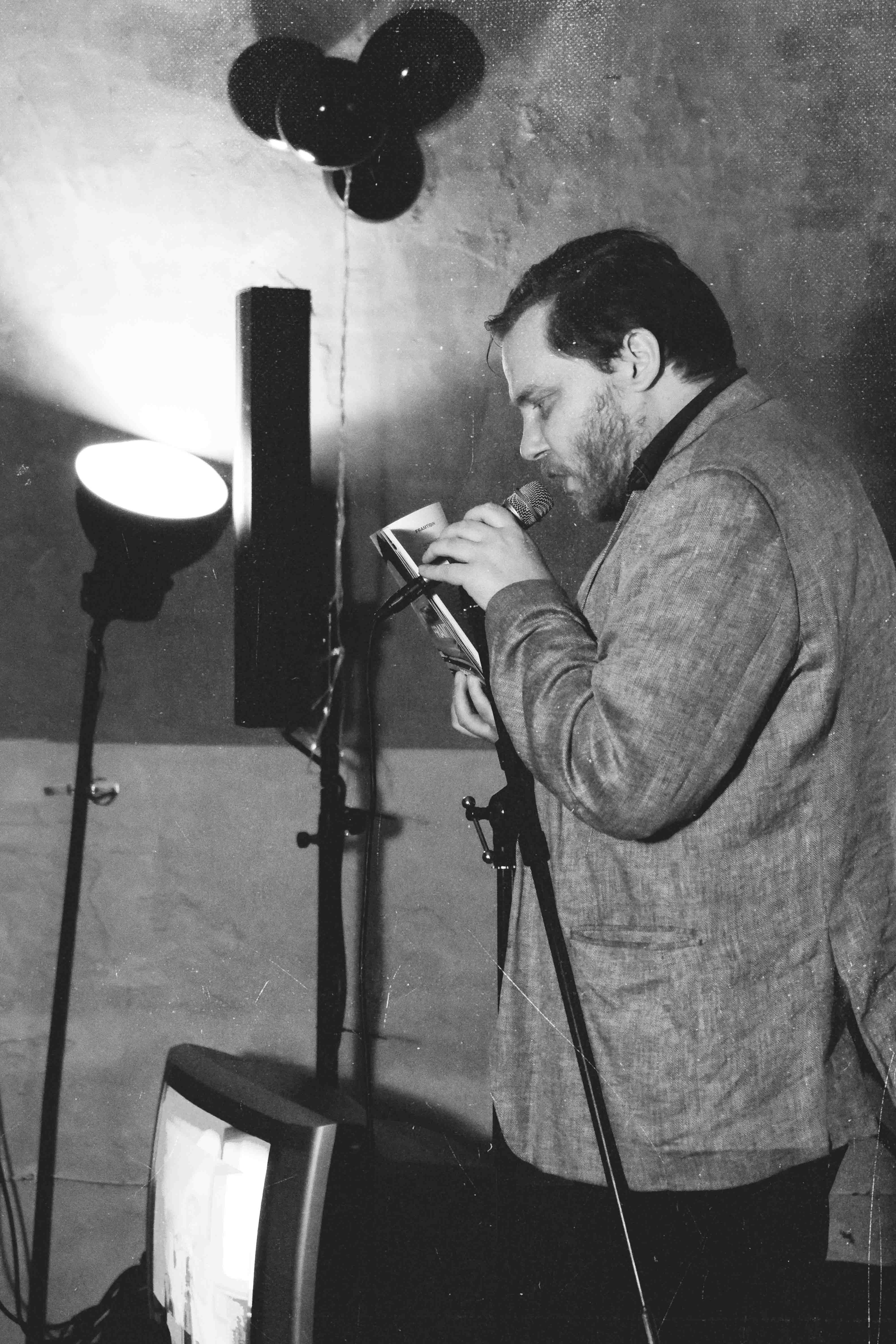
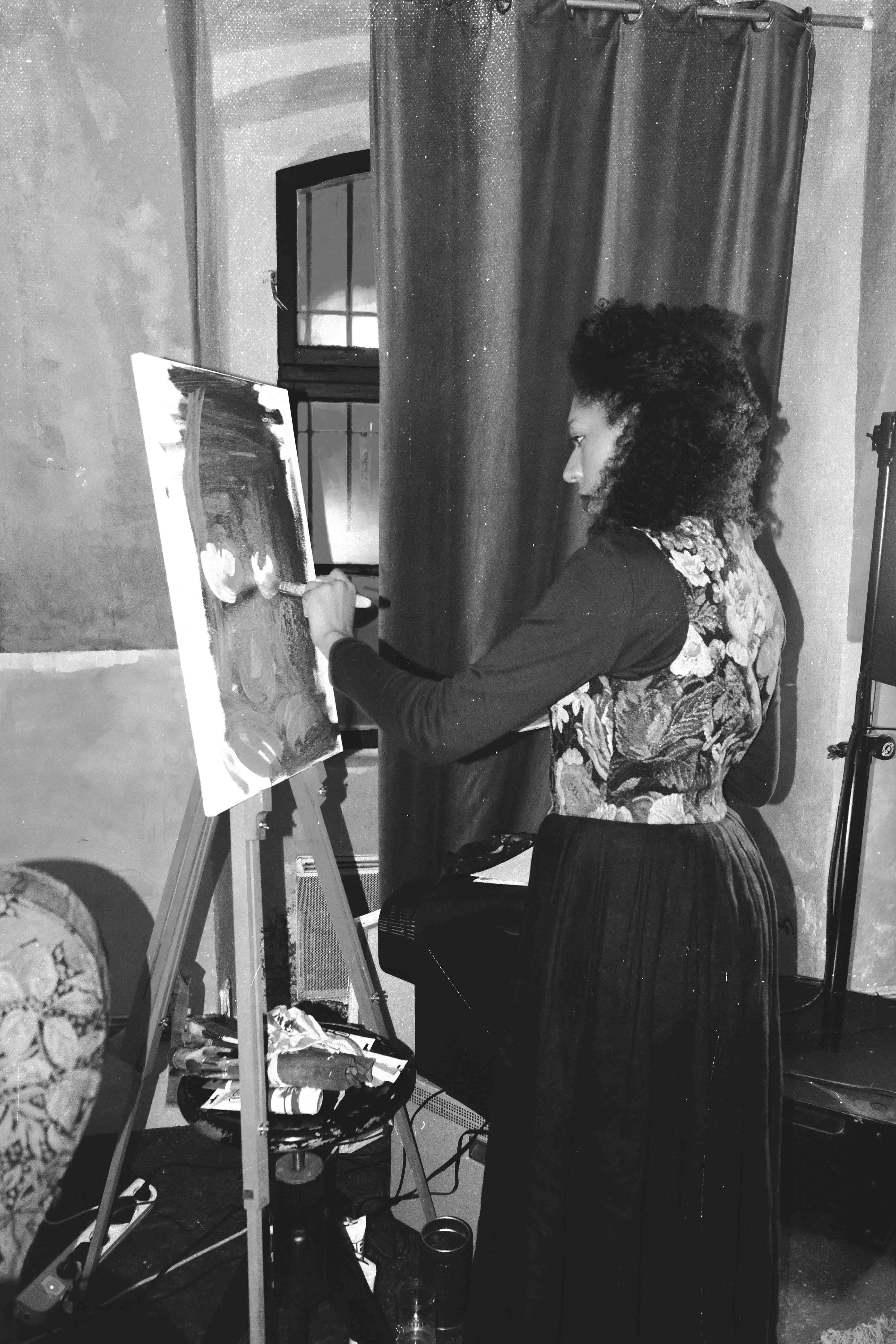
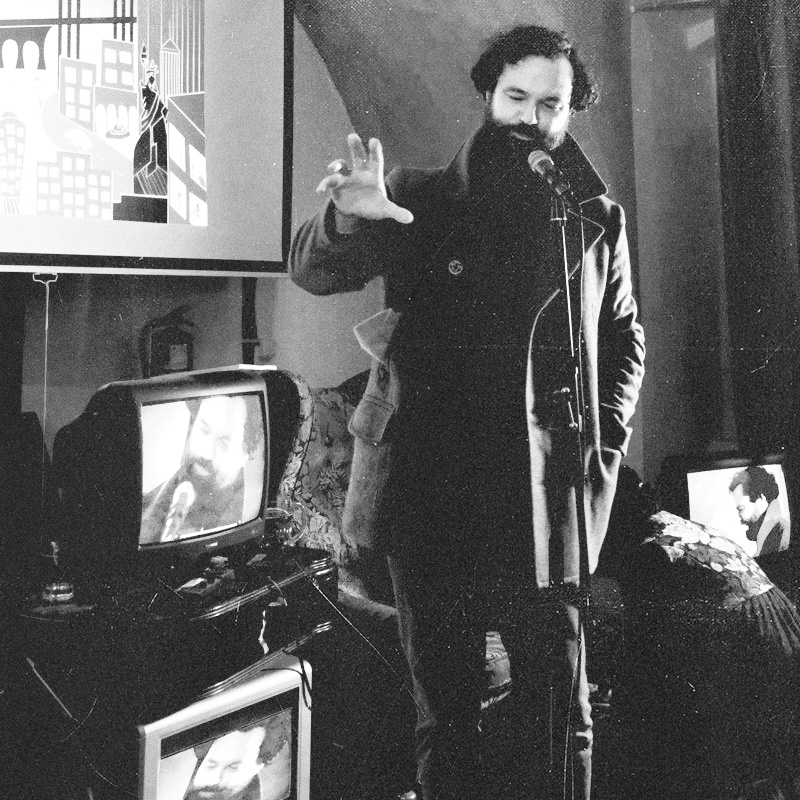
Stephan looks into the sea of long-looking eyes that question him which direction they would be pointed next. Stephan takes long pauses in his breath,
“Words”
“just words”
“just words”
“in just words”
“in just words”
“it’ll be explained“
“in just words”
“words”
“in just words in just us”
“justine and I”
“we walked”
“in just words”
Like synchronized evening smokers at the swingers’ party, Jaromír and Tyko wave their typewriters above their heads, their typewritten papers like tongues licking the space between them and Stephan as Clara dips again her paintbrush into the soup can.
“the words she said
“the wars”
“Justince said”
“I can hear the words“
“the wars”
“just words”
“just words”
“in just words”
“in just words”
“it’ll be explained“
“in just words”
“words”
“in just words in just us”
“justine and I”
“we walked”
“in just words”
“the wars”
“Justince said”
“I can hear the words“
“the wars”
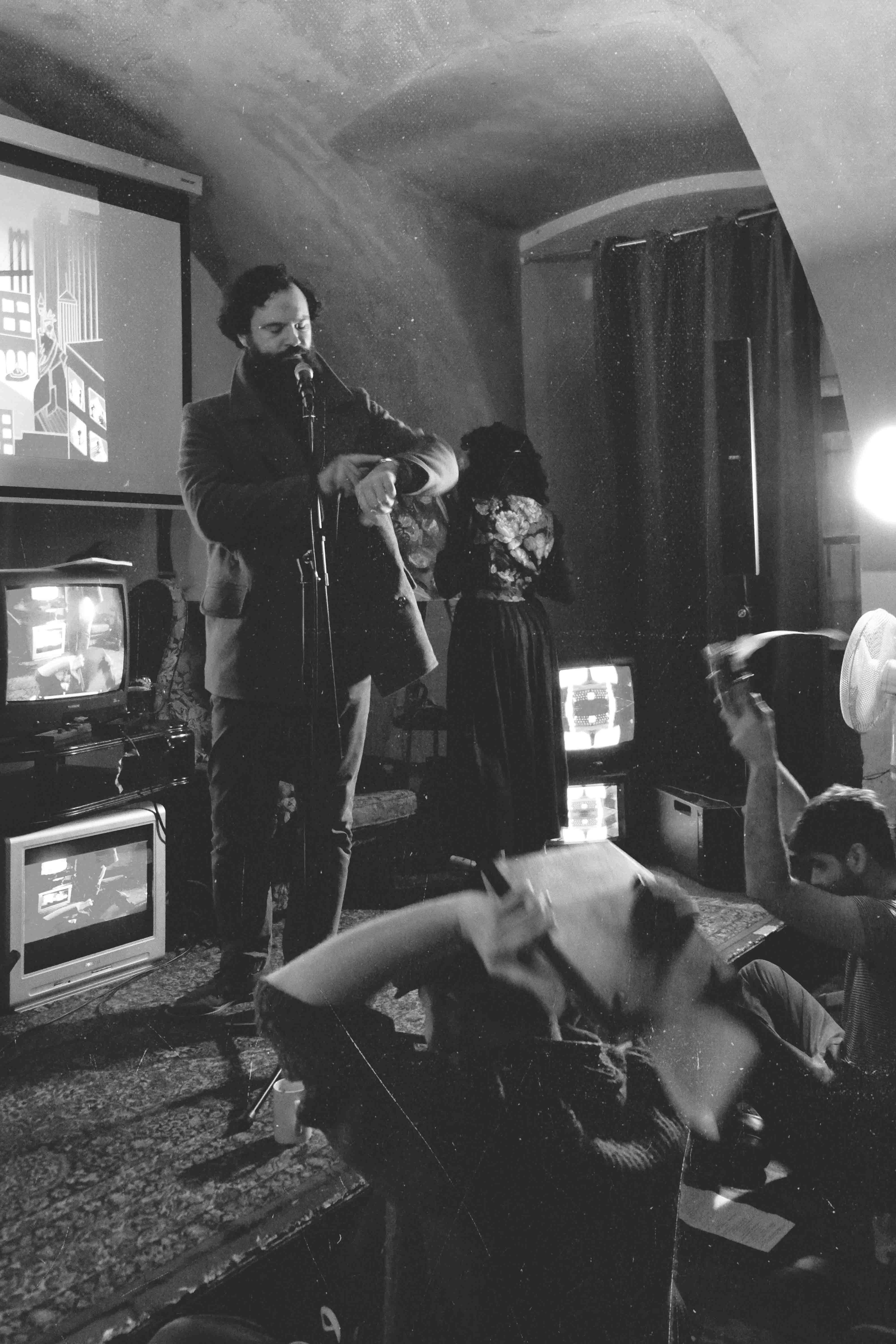
Roksan and Heyme fill the spaces left within the words, the wars, as Stephan steps slowly off the stage and into the applause and onlook. The typewritten pages now torn from the machines and scattered for the mechanics.
And, then, suddenly, Joanka Taurogińska peers through the iron windows with a box assorted with and in fabrics and colors. Tyko waves her in and she shyly twirls toward the stage, placing down with a heavy thumb a messy container of clothes. Clara and her swap places and she stands with what could have been an accidental smile. The moment weighs.
Hunter Andrews and Yeva Kupchenko duck and limbo toward the stage, step up, and stand as human dolls facing the eyes of the crowd. A fan gently blows Yeva’s hair, the static from the TV catching a strand and holding it in the air. A moment suspended. The audience watches the camera zoom into all the faces of the room turning gesture into static of late-night television.
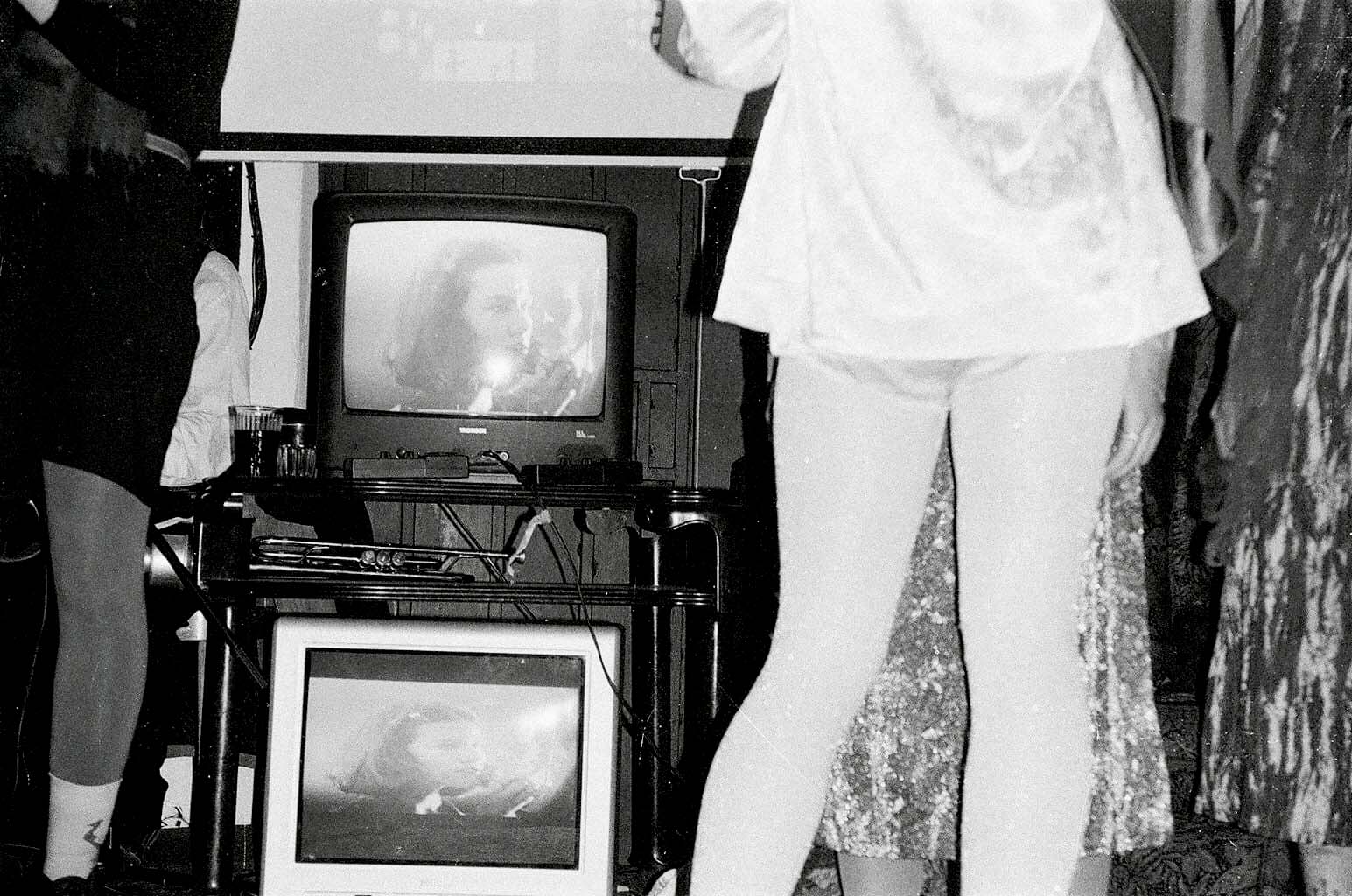
Joanka undresses her dolls, slowly--beginning with Yeva by pulling her blouse over her shoulders. Yeva stands with her arms up while Hunter follows, undoing his belt and now standing (almost) completely shy and naked before the audience.
Heyme interrupts the gaze in a tapping of his trumpet buttons. Roksan follows. The five of them there, for the moment, interpreting and existing in musical and spatial momentum.

Joanka begins testing different skirts, shirts, and accessories with the composition. Red lipstick for both of them. An umbrella. A ribbon in Yeva’s hair.
Adéla Hrdličková dances to the stage and toys with Yeva, holding her hand and manipulating the shared language. She begins reading from the tip of her brain, finding language for all the things she wants to say. An improvised sentence. An improvised movement. A rhythm of static timbre found & manipulated.
Adéla spins Yeva like a ballerina. Yeva twists the language in the twirl of her skirt. Both of their movements encouraging their next. Adéla guides Yeva and Hunter to the chair and gives the stage back to the space.
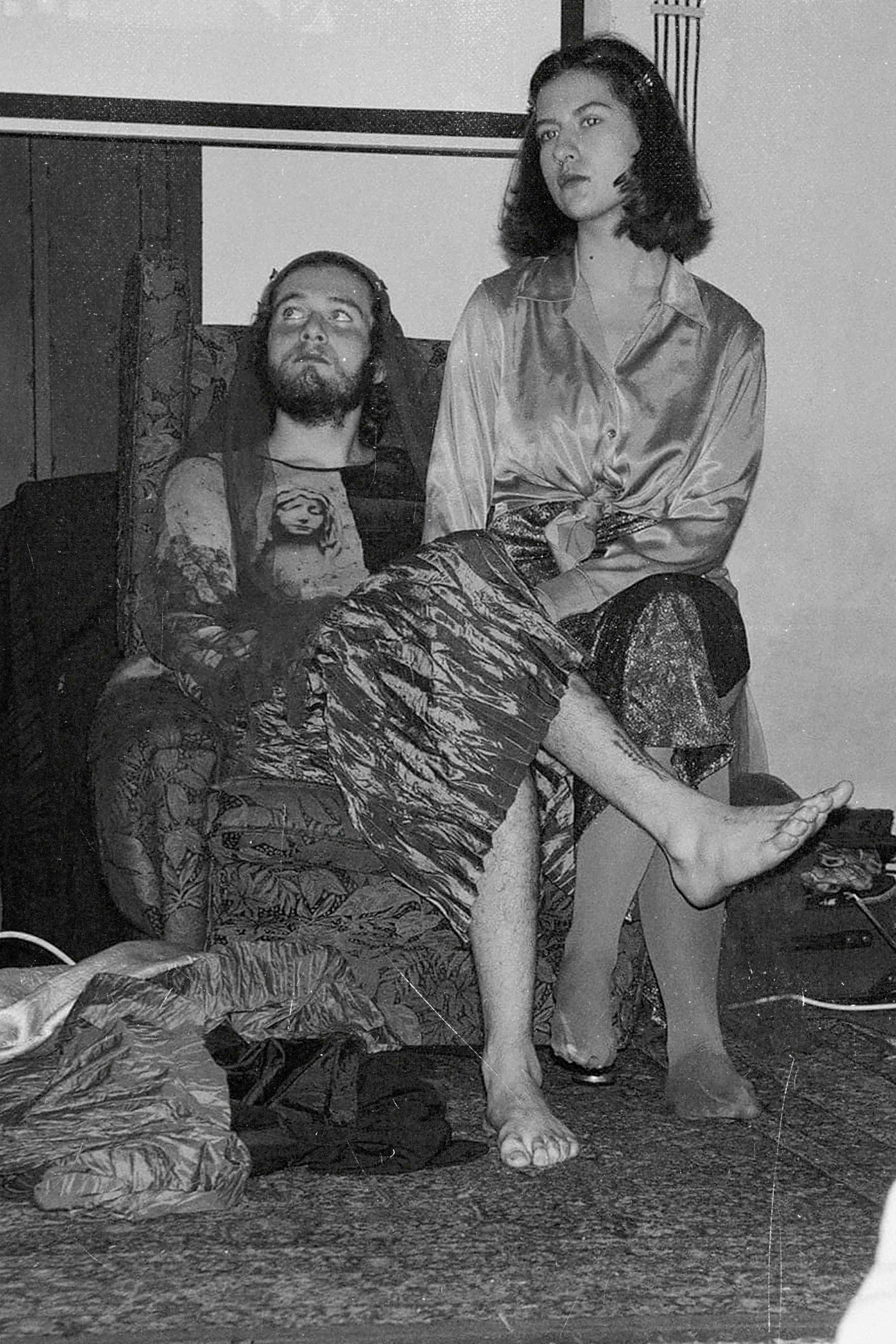
Yeva and Hunter begin kissing passionately, the red lipstick on their lips becoming a singular sentence written and read across them. The chair barely holds them. The horn and keys swing. The TV hisses. The composition not yet finished.
Maria Ferynů and Kateřina Matuštíková assume the space with a drum machine and police tape. Nearing midnight, the two begin wrapping themselves in the hazard tape. Yeva and Hunter remain locked at the lips. A tongue for tasting the sentence in.
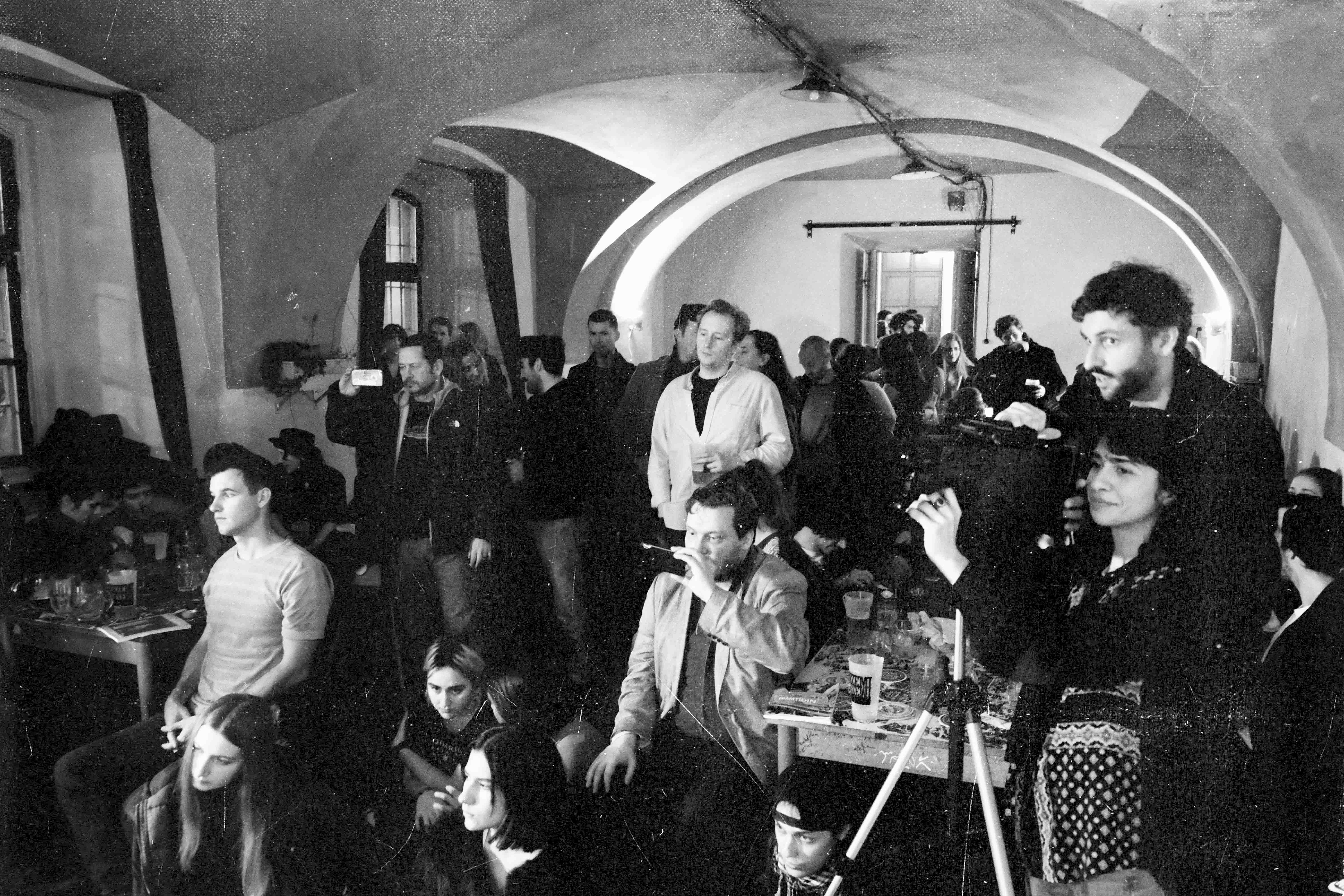
Maria cues a heartbeat on the drum machine--two taps and a held breath--while Kateřina dresses her shoulders in hazard tape, the yellow spelling POZOR like a mantra. The tape winds, unwinds, becomes bandage & banner. Yeva and Hunter still a single red sentence.
“Řekni to znovu,” someone calls--say it again--and the drum answers with a second lick of ticks. CRTs blink to blue, then snow. Sandra rides the V4, folding faces into color blocks: cheekbones in violet, knuckles in green, with the moment velvet inside the TV mind. The horn skims the ceiling and drops low, sitting in the chest like koruna.
Slyšíš? Do you hear?
Papers from the typewriters drift ankle-high. Clara’s verticals dry to a matte hush. The tongue in Hunter’s throat. The profiles of a poet. The audience breathes together--one long pull--then lets go.
Outside, a tram bell tests the window. Inside, Maria kills the kick and leaves a single click that counts down to nothing. e-v-e-r-y-t-h-i-n-g. Kateřina lifts the last loop of tape, holds it like an endnote, and releases. It finds the floor the way a sentence finds its end.
The walkie-talkie cracks once--over--and the horn answers with a smile. The neon on the TVs turn to black. The door at Zázemí opens and the street air greets us on the way out: ticho at the threshold, a drink on the stairs, jsme tady the british man says.
And as we stepped into the night carrying pieces of the same sentence on our tongues, we smiled knowing that we found a new language and channel to communicate it from.
See the film of the project here ︎
Participants
Readers
Tyko Say
Thor Garcia
Jaromír Lelek
Stephan Delbos
Adéla Hrdličková
Maria Ferynů
Kateřina Matuštíková
Musicians
Heyme Langbroek
Roksan Mandel
Performers
Tyko Say
Jaromír Lelek
Joanka Taurogińska
everythingisterrible
Yeva Kupchenko
Hunter Andrews
Clara Zangova
Sandra Pasławska
Thor Garcia
Jaromír Lelek
Vojtěch Kudla
Ásgeir H IngólfssonStephan Delbos
Adéla Hrdličková
Maria Ferynů
Kateřina Matuštíková
Musicians
Heyme Langbroek
Roksan Mandel
Performers
Tyko Say
Jaromír Lelek
Joanka Taurogińska
everythingisterrible
Yeva Kupchenko
Hunter Andrews
Clara Zangova
Sandra Pasławska
This event was also the album release party for OBJECT:PARADISE VOL. 1, which is available on all major streaming services.
The album feature readings from from Tyko Say & Jeff Milton, and improvised sound from Jenda Pudlák & Heyme Langbroek.
The album was produced by Tyko Say & Levente Szabó, and designed by Roksan Mandel & digitalized by Elina Osipova.
︎Additional Media
Full film of the evening
